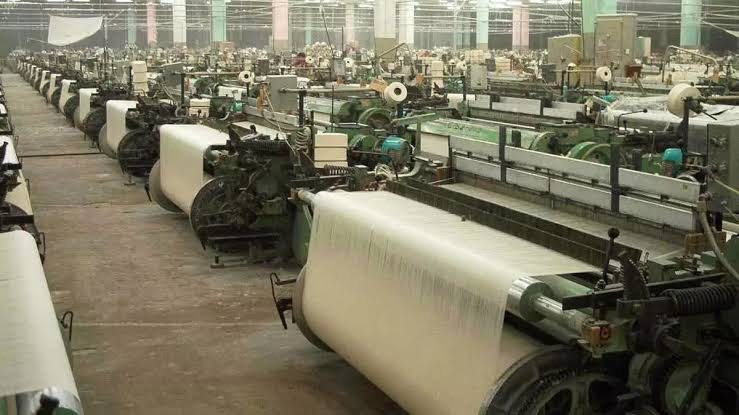By Olaitan Ibrahim
The Federal Government’s fresh push to revamp the once vibrant textile industry could face age-old problems such as foreign exchange crunch, funds mismanagement, high energy costs and poor capacity for competition.
Just recently, Vice-President Kashim Shettima set up a committee saddled with the responsibility of developing a roadmap for the revitalisation of the cotton/textile sector in Nigeria.
But before the committee setup, Doris Uzoka-Anite, minister of industry, trade and investment, had announced that the government secured some $3.5 billion to develop the ‘Resurgence Plan for Optimized Performance of the Nigerian Cotton, Textile and Apparel Industry’ in partnership with development partners and private sector players to unlock the sector.
However, experts have argued that reviving the industry goes beyond mere financial provisions, noting that while funding is essential, creating a sustainable enabling environment must be paramount.

In the past, substantial financial interventions have been made to revive the industry. In 2009, a N100 billion intervention loan was introduced, followed by a targeted N255 billion allocation in 2015 under former President Goodluck Jonathan.
The Central Bank of Nigeria (CBN) also floated a N50 billion ‘CBN textile Intervention fund’ to revive the ailing textile industry in 2021.
The fund was to be administered by the Bank of industry (BoI) at 4.5 per cent interest rate and was to use any of the CBN-approved non-interest financing instruments for refinancing.
Despite these significant financial injections, the industry remains moribund without one single full-fledged textile company in Nigeria.
To effectively rebuild the textile sector, experts recommend revitalising cotton farming and developing the petrochemical industry.
They add that the environment should be characterised by low operating costs, long-term financing from banks, and consistent government policies that promote economic activities and job creation.
Adetokunbo Kayode, former president of Abuja Chamber of Commerce and Industry, said the collapse of the industry is driven largely by smuggling, failed government policies, high cost of doing business arising from high-priced raw materials, skyrocketing energy costs, and poor investment climate in Nigeria.
“For the private sector, an attractive investment climate is crucial, as it drives growth and innovation,” he said.
He explained that Nigeria’s cotton belt, which once stretched from Funtua in Katsina State to Sokoto and extended into Niger and Burkina Faso, has seen a significant decline. However, with concerted efforts and clear policy direction, the agricultural base can be restored, he said.
“By empowering serious private sector operators, particularly in the North-West, and providing them with the necessary resources and infrastructure, Nigeria’s textile sector could be brought back to life. With strategic planning and unwavering dedication, the country has the potential to reclaim its position as a major player in the global textile market,” he noted.
Samuel Nzekwe, a financial analyst and former president of the Association of National Accountants of Nigeria (ANAN), said that the nation’s textile industry has been brought to its knees by a combination of infrastructural deficits and cheap imports from Asia.
He noted that the country is wasting so much foreign exchange (FX) on the importation of textile materials, which can be avoided if the government resuscitates the textile sector and put an end to smuggling.
“The textile sector played an important role in the economy. It was when the sector could not stand that we started to have unemployment here and there. In those days, if you came to Lagos or even in Kano or Kaduna, you could get jobs that way in the textile industry.
“Unfortunately, the government did not pay attention and then the issue of smuggling started and the government could not stop it because most of the materials that were brought from abroad were cheaper than the one the textiles produced in Nigeria.”
He advised the government to curb smuggling, resolve insecurity and energy problems to revive the textile industry for sustainable economic development.
Importation of textile products into the country increased over a period of four years from N182.5 billion in 2020 to N377.1 billion in 2023, according to data from the National Bureau of Statistics (NBS).
Total textile trade within the period was N1.5 trillion, with imports totaling N1.4 trillion, representing 96.5 percent.
In 2019, NBS reported that N220.5 billion worth of textile products were imported into the country; N182.5 billion in 2020; N278.8 billion in 2021, and N365.5 billion in 2022.
On the other hand, textile exports, mostly cotton and apparels, within the period was N3.3 billion in 2019; N6.0 billion in 2020; N12.3 billion in 2021; N10.3 billion in 2022; and N18.8 billion in 2023.
Some of the textiles companies that enjoyed the boom in the golden era then included: Kaduna Textile Ltd (KTL), Arewa Textiles Plc, United Nigerian Textile Plc, Supertex, Nortex Nigerian Ltd and Finetex Nigerian Ltd. Others were: Gaskiya Textiles Mill, Kano Textile Ltd, Aba Textiles, Zamfara Textiles Ltd, Asaba Textiles Ltd, African Textile Mill Plc, Tofa Textiles and several others such as Afprint, Atlantic Textiles Mill, Spintex, 5-Stars and Speco Mills Ltd.
Things turned in the early nineties when companies began to shut down, from about 180 thriving textile companies to almost zero.
“There could be some subsidy or lower interest rate. Textile is a capital-intensive sector. So, the government must see how to help,” Nzekwe added.